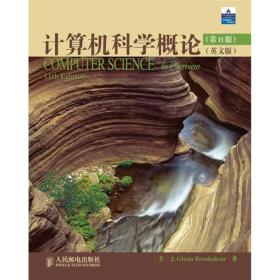
计算机科学概论(第11版)(英文版)
¥ 12.05 2.0折 ¥ 59 九品
仅1件
北京海淀
认证卖家担保交易快速发货售后保障
作者[美]布鲁克希尔 著
出版社人民邮电出版社
出版时间2012-05
版次11
装帧平装
货号A2
上书时间2024-12-24
- 在售商品 暂无
- 平均发货时间 14小时
- 好评率 暂无
- 最新上架
商品详情
- 品相描述:九品
图书标准信息
- 作者 [美]布鲁克希尔 著
- 出版社 人民邮电出版社
- 出版时间 2012-05
- 版次 11
- ISBN 9787115277947
- 定价 59.00元
- 装帧 平装
- 开本 16开
- 纸张 胶版纸
- 页数 609页
- 字数 737千字
- 正文语种 英语
- 原版书名 Computer Science: an Overview, 11E
- 丛书 国外著名高等院校信息科学与技术优秀教材
- 【内容简介】
-
布鲁克希尔编著的《计算机科学概论(第11版)》是计算机科学概论课程的经典教材,全书对计算机科学做了百科全书式的精彩阐述,充分展现了计算机科学的历史背景、发展历程和新的技术趋势。本书首先介绍的是信息编码及计算机体系结构的基本原理(第1章和第2章),进而讲述操作系统(第3章)和组网及因特网(第4章),接着探讨了算法、程序设计语言及软件工程(第5章至第7章),然后讨论数据抽象和数据库(第8章和第9章)方面的问题,第10章通过图形学讲述计算机技术的一些主要应用,第11章涉及人工智能,第12章通过对计算理论的介绍来结束全书。本书在内容编排上由具体到抽象逐步推进,很适合教学安排,每一个主题自然而然地引导出下一个主题。此外,书中还包含大量的图、表和示例,有助于读者对知识的了解与把握。《计算机科学概论(第11版)》适合用作高等院校计算机以及相关专业本科生的教材。
- 【作者简介】
- 布鲁克希尔(J.GlennBrookshear),世界知名的计算机科学教育家。他在1975年获得墨西哥州立大学博士学位后,创立了Marquette大学的计算机科学学位项目,并在该校任教至今。他的主要研究方向是计算理论。著有Theoryof Computation:Formal Languanges,Automata,and Complexity。
- 【目录】
-
目 录
Chapter 0 Introduction 1
0.1 The Role of Algorithms 2
0.2 The History of Computing 4
0.3 The Science of Algorithms 10
0.4 Abstraction 11
0.5 An Outline of Our Study 12
0.6 Social Repercussions 13
Chapter 1 Data Storage 19
1.1 Bits and Their Storage 20
1.2 Main Memory 26
1.3 Mass Storage 29
1.4 Representing Information as Bit Patterns 35
*1.5 The Binary System 42
*1.6 Storing Integers 47
*1.7 Storing Fractions 53
*1.8 Data Compression 58
*1.9 Communication Errors 63
Chapter 2 Data Manipulation 73
2.1 Computer Architecture 74
2.2 Machine Language 77
2.3 Program Execution 83
*2.4 Arithmetic/Logic Instructions 90
*2.5 Communicating with Other Devices 94
*2.6 Other Architectures 100
Chapter 3 Operating Systems 109
3.1 The History of Operating Systems 110
3.2 Operating System Architecture 114
3.3 Coordinating the Machine’s Activities 122
*3.4 Handling Competition Among Processes 125
3.5 Security 130
Chapter 4 Networking and the Internet 139
4.1 Network Fundamentals 140
4.2 The Internet 149
4.3 The World Wide Web 158
*4.4 Internet Protocols 167
4.5 Security 173
Chapter 5 Algorithms 187
5.1 The Concept of an Algorithm 188
5.2 Algorithm Representation 191
5.3 Algorithm Discovery 198
5.4 Iterative Structures 204
5.5 Recursive Structures 214
5.6 Efficiency and Correctness 222
Chapter 6 Programming Languages 239
6.1 Historical Perspective 240
6.2 Traditional Programming Concepts 248
6.3 Procedural Units 260
6.4 Language Implementation 268
6.5 Object-Oriented Programming 276
*6.6 Programming Concurrent Activities 283
*6.7 Declarative Programming 286
Chapter 7 Software Engineering 299
7.1 The Software Engineering Discipline 300
7.2 The Software Life Cycle 302
7.3 Software Engineering Methodologies 306
7.4 Modularity 308
7.5 Tools of the Trade 316
7.6 Quality Assurance 324
7.7 Documentation 328
7.8 The Human-Machine Interface 329
7.9 Software Ownership and Liability 332
Chapter 8 Data Abstractions 341
8.1 Basic Data Structures 342
8.2 Related Concepts 345
8.3 Implementing Data Structures 348
8.4 A Short Case Study 362
8.5 Customized Data Types 367
*8.6 Classes and Objects 371
*8.7 Pointers in Machine Language 372
Chapter 9 Database Systems 383
9.1 Database Fundamentals 384
9.2 The Relational Model 389
*9.3 Object-Oriented Databases 400
*9.4 Maintaining Database Integrity 402
*9.5 Traditional File Structures 406
9.6 Data Mining 414
9.7 Social Impact of Database Technology 416
Chapter 10 Computer Graphics 425
10.1 The Scope of Computer Graphics 426
10.2 Overview of 3D Graphics 428
10.3 Modeling 430
10.4 Rendering 439
*10.5 Dealing with Global Lighting 449
10.6 Animation 452
Chapter 11 Artificial Intelligence 461
11.1 Intelligence and Machines 462
11.2 Perception 467
11.3 Reasoning 473
11.4 Additional Areas of Research 484
11.5 Artificial Neural Networks 489
11.6 Robotics 497
11.7 Considering the Consequences 500
Chapter 12 Theory of Computation 509
12.1 Functions and Their Computation 510
12.2 Turing Machines 512
12.3 Universal Programming Languages 516
12.4 A Noncomputable Function 522
12.5 Complexity of Problems 527
*12.6 Public-Key Cryptography 536
Appendixes 545
A ASCII 547
B Circuits to Manipulate Two's Complement Representations 548
C A Simple Machine Language 551
D High-Level Programming Languages 553
E The Equivalence of Iterative and Recursive Structures 555
F Answers to Questions & Exercises 557
Index 597
点击展开
点击收起
— 没有更多了 —












以下为对购买帮助不大的评价